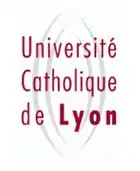Catholic University of Lyon
Lyon Catholic University or UCLy also known as the Lyon Catholic Institute (Institut catholique de Lyon), is a private university based in Lyon, and Annecy, France.
Université catholique de Lyon ( Institut catholique de Lyon ) | |
 | |
| Type | Private |
|---|---|
| Established | 1875 |
| President | Thierry Magnin |
| Students | 10,000 |
| Location | , |
| Website | www.ucly.fr/en/ |
History
The Lyon Catholic University has stood at the confluence of the Saône and Rhône Rivers in the center of Lyon since its founding. Its creation in 1875 was initiated by lay Catholics following passage of a law on the freedom of higher education. Inaugural classes began in 1875.
Since 2005, the Catholic University of Lyon has been located on two campuses that are close to each other in the center city:
The Carnot Campus houses the Faculty of Theology and Religious Sciences, the Faculty of Philosophy, Psychology and Education, the Faculty of Modern Languages and Literature including the ESTRI School of Translation and international relations,
The Saint-Paul Campus houses the Faculty of Legal, Political and Social Sciences, the Faculty of Sciences and biotechnologies, Lyon Business School, ESDES together with the rectorate, the university administration, central university services, the Department of Humanities and the 'Lyon Polytechnic Institute'.
UCLy is now situated on three campuses, two within the heart of the city of Lyon (Carnot / Saint Paul) and the other, in Annecy, which opened at the start of the 2020 academic year.
UCLy is a non-profit-making organisation granted the status of a public interest private higher education institution (EESPIG) by the French government, and as such, it contributes to providing the public service of higher education.
The rector since September 2019 is the theologian Olivier Artus.
The university offers a government-backed diploma in religious freedom and secularism, designed especially for foreign Muslim imams; however, not enough people enroll in it.[1]
Facts and Figures
- 11,700 students, including 2,100 from abroad
- 340 permanent teaching staff
- 262 administrative staff
- 6 Faculties
- 5 vocational schools
Three types of courses
- Traditional university courses with six faculties:
- Faculty of Legal, Political and Social Sciences
- Faculty of Philosophy, Psychology and Education
- Faculty of Theology and Religious Sciences (Divinity, Interreligious studies...)
- Faculty of Sciences (Biology, biological and medical sciences...)
- Faculty of Modern Languages and Literature (French Literature, intercultural and international communication, translation, history, political sciences...)
- Professionally oriented courses at its 'schools':
- ESDES Business School
- ESTRI School of Translation and International Relations
- ESQESE School of Environmental Quality and Safety
- ESTBB Engineering School of Biotechnology
- IFTLM School for Medical LaboratoryTechnicians
- Specific courses at training centres and research laboratories
- Institute of French Language and Culture (ILCF)
- Pierre Gardette Institute, which promotes the languages and cultures of the Rhône-Alpes region
- Lyon Institute of Human Rights (IDHL)
- Pastoral Institute for Religious studies (IPER)
- Institute Society and Family (ISF)
- International Centre for Local development studies (CIEDEL)
University Library
- The main library Henri de Lubac contains 400,000 books and 2,000 journals in the areas of philosophy, history, literature, humanities, natural science and theology.
The library belongs to the SUDOC network ('Service Universitaire de Documentation') which interconnects with some 3,000 libraries elsewhere in France.
References
- Sophie Pedder (30 September 2017). "How France's regions reflect the country's diversity". The Economist.